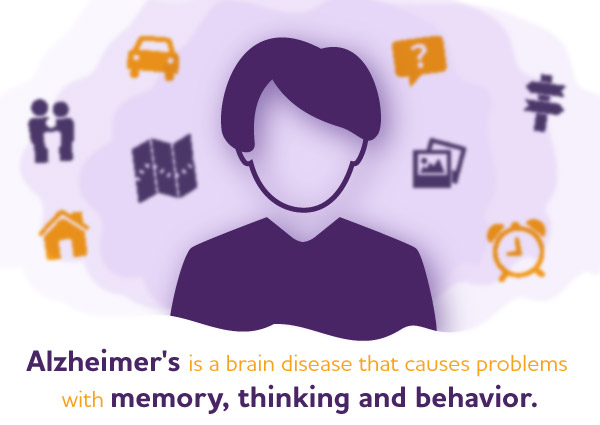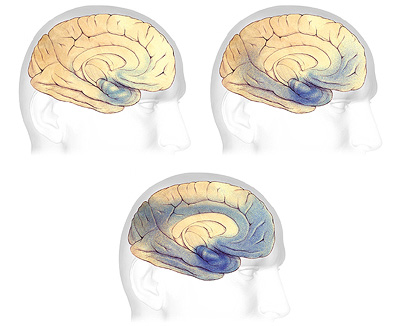Family Members Who See the Signs of Alzheimer's
Alzheimer's is a type of dementia that affects memory, thinking and behavior. Symptoms eventually grow severe enough to interfere with daily tasks.
Subscribe to E-News to learn how you tin help those affected by Alzheimer's.
- Understanding Alzheimer'southward and dementia
- Plaques and tangles
- Symptoms
- Research
- Changes in the encephalon
 Understanding Alzheimer'due south and dementia
Understanding Alzheimer'due south and dementia
Alzheimer's is the most common cause of dementia, a general term for retentiveness loss and other cognitive abilities serious enough to interfere with daily life. Alzheimer'due south illness accounts for threescore-lxxx% of dementia cases.
Learn more than: What is the Difference Betwixt Dementia and Alzheimer's?, What is Dementia, Research and Progress
Alzheimer'due south is non a normal part of crumbling. The greatest known risk cistron is increasing age, and the bulk of people with Alzheimer's are 65 and older. Alzheimer's disease is considered to be younger-onset Alzheimer'southward if information technology affects a person under 65. Younger-onset can likewise be referred to as early-onset Alzheimer's. People with younger-onset Alzheimer's can exist in the early, centre or late phase of the disease.
Acquire more: Younger/Early on-Onset Alzheimer'south, Take a chance Factors
Families facing Alzheimer's need you
Donate today so we can continue advancing research and providing free 24/vii support to those who depend on it.
Donate Now
Alzheimer'due south worsens over time. Alzheimer's is a progressive disease, where dementia symptoms gradually worsen over a number of years. In its early stages, memory loss is mild, just with tardily-stage Alzheimer'southward, individuals lose the ability to carry on a conversation and respond to their environment. Alzheimer's is the sixth-leading crusade of death in the U.s.. On boilerplate, a person with Alzheimer'due south lives iv to 8 years after diagnosis but can live as long as 20 years, depending on other factors.
Learn more: x Warning Signs, Stages of Alzheimer'southward Illness
Alzheimer's has no cure, simply one treatment — aducanumab (Aduhelm™) — is the first therapy to demonstrate that removing amyloid, one of the hallmarks of Alzheimer's disease, from the brain is reasonably likely to reduce cognitive and functional turn down in people living with early Alzheimer's. Other treatments can temporarily slow the worsening of dementia symptoms and improve quality of life for those with Alzheimer's and their caregivers. Today, there is a worldwide effort underway to discover better ways to care for the disease, delay its onset and prevent it from developing.
Learn more: Treatments, Treatment Horizon, Prevention, Clinical Trials
Assist is available
If you or someone yous know has been diagnosed with Alzheimer'southward or some other dementia, yous are non alone. The Alzheimer's Association is the trusted resource for reliable information, education, referral and back up to millions of people affected by the disease.
- Call our 24/7 Helpline: 800.272.3900
- Locate your local Alzheimer's Association
- Use our Virtual Library
- Go to Alzheimer's Navigator to create customized activeness plans and connect with local support services
Symptoms of Alzheimer's
The most common early symptom of Alzheimer's is difficulty remembering newly learned information.
Only like the rest of our bodies, our brains alter as we age. Almost of u.s.a. somewhen notice some slowed thinking and occasional problems with remembering sure things. Yet, serious retentivity loss, confusion and other major changes in the way our minds piece of work may exist a sign that encephalon cells are declining.
Alzheimer'south changes typically begin in the office of the brain that affects learning. As Alzheimer's advances through the brain information technology leads to increasingly astringent symptoms, including disorientation, mood and beliefs changes; deepening confusion about events, time and place; unfounded suspicions about family, friends and professional person caregivers; more serious memory loss and beliefs changes; and difficulty speaking, swallowing and walking.
People with memory loss or other possible signs of Alzheimer's may discover information technology hard to recognize they have a problem. Signs of dementia may be more obvious to family members or friends. Anyone experiencing dementia-like symptoms should see a doctor as soon equally possible. If y'all need assistance finding a doctor with feel evaluating retentivity problems, your local Alzheimer's Association can help. Earlier diagnosis and intervention methods are improving dramatically, and handling options and sources of back up can improve quality of life. Two helpful support resources you tin can tap into are ALZConnected, our message boards and online social networking community, and Alzheimer's Navigator, a web tool that creates customized activeness plans, based on answers y'all provide through short, online surveys.
Accept our gratis, online education courses: Understanding Alzheimer'southward and Dementia and Know the ten Signs: Early Detection Matters
Alzheimer's is not the only cause of memory loss
Many people have trouble with memory — this does NOT mean they have Alzheimer's. In that location are many unlike causes of retentivity loss. If y'all or someone you know is experiencing symptoms of dementia, it is best to visit a doctor and so the cause tin be determined.
Larn More
Alzheimer's and the brain
Microscopic changes in the brain begin long before the first signs of retentivity loss.
The brain has 100 billion nerve cells (neurons). Each nervus cell connects with many others to form communication networks. Groups of nerve cells take special jobs. Some are involved in thinking, learning and remembering. Others help us see, hear and odor.
To do their piece of work, brain cells operate like tiny factories. They receive supplies, generate energy, construct equipment and get rid of waste. Cells also process and shop information and communicate with other cells. Keeping everything running requires coordination as well every bit large amounts of fuel and oxygen.
Scientists believe Alzheimer's disease prevents parts of a cell'southward manufactory from running well. They are not certain where the trouble starts. But merely like a real factory, backups and breakdowns in ane system cause bug in other areas. As damage spreads, cells lose their ability to do their jobs and, eventually die, causing irreversible changes in the brain.
The function of plaques and tangles
2 abnormal structures called plaques and tangles are prime suspects in damaging and killing nervus cells.
- Plaques are deposits of a protein fragment called beta-amyloid (BAY-tuh AM-uh-loyd) that build upward in the spaces between nervus cells.
- Tangles are twisted fibers of another protein called tau (rhymes with "wow") that build up inside cells.
 Though autopsy studies show that most people develop some plaques and tangles as they age, those with Alzheimer's tend to develop far more and in a predictable pattern, beginning in the areas important for retentiveness before spreading to other regions.
Though autopsy studies show that most people develop some plaques and tangles as they age, those with Alzheimer's tend to develop far more and in a predictable pattern, beginning in the areas important for retentiveness before spreading to other regions.
Scientists do not know exactly what role plaques and tangles play in Alzheimer's disease. Most experts believe they somehow play a disquisitional function in blocking advice among nerve cells and disrupting processes that cells demand to survive.
It'south the destruction and expiry of nerve cells that causes retentivity failure, personality changes, problems carrying out daily activities and other symptoms of Alzheimer'due south illness.
Learn More: Accept the Encephalon Bout
Enquiry and progress
In 1906, German doc Dr. Alois Alzheimer first described "a peciliar affliction" — one of profound retention loss and microscopic brain changes — a disease we now know as Alzheimer's.
Today, Alzheimer's is at the forefront of biomedical research. Researchers are working to uncover as many aspects of Alzheimer's disease and other dementias as possible. Some of the almost remarkable progress has shed calorie-free on how Alzheimer'southward affects the brain. The promise is this better understanding volition lead to new treatments. Many potential approaches are currently under investigation worldwide. Sign upwards for our weekly Eastward-News to receive updates about Alzheimer'due south and dementia care and research.
Larn more than: Research and Progress
Source: https://www.alz.org/alzheimers-dementia/what-is-alzheimers